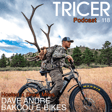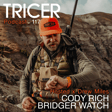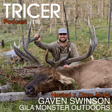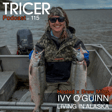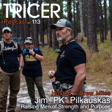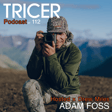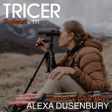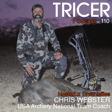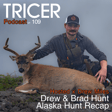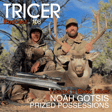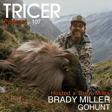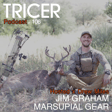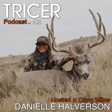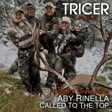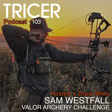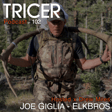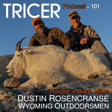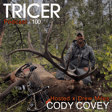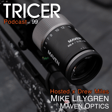Become a Creator today!Start creating today - Share your story with the world!
Start for free
00:00:00
00:00:01

Becoming a Western Hunter – Whitney Tramel
This week Drew has Whitney Tramel on the Tricer Podcast. Drew and Whitney talk about the journey of becoming a wester, backcountry hunter. Whitney tells the story of how she became a hunter and her path to the west. Whitney is also the host of the Wild Strength Podcast, a mix of hunting and wild things with fitness and everything in between. Follow along with Whitney to see her continue her journey chasing deer, elk and all things western.
WHITNEY TRAMEL
Instagram - @whitneytramel_
Wild Strength Podcast - @wildstrengthpodcast
TRICER USA
Website – https://tricerusa.com/
Instagram - https://www.instagram.com/tricerusa/
Facebook - https://www.facebook.com/tricerusa/
YouTube - https://www.youtube.com/@tricer6985
Transcript
Introduction to Tricer Podcast and Whitney Trammell
00:00:01
Speaker
You are listening to the Tricer Podcast where we talk all things hunting, gear, and the great outdoors. Before we begin, let's start things out right and put God first. Lord Jesus, I thank you for Tricer, and I ask that you can use this podcast as a way to bring joy to all of our listeners. We lay Tricer and this podcast at your feet. Amen. All right.
00:00:25
Speaker
Last day of Utah Tech, hanging out with Whitney Trammell. It rhymes with camel, she said, so I'm going to remember it now. and Whitney is someone who I shot with in San Diego to know, yep did ah did the bow type we'll shoot with. She's kind of a bad eight because you wouldn't think it, but she's drawing back 60 pounds.
00:00:46
Speaker
Yes, yes, yes. And she could shoot. So Whitney, how are you doing? I'm doing good. How are you? I'm glad that we were ran into you here. And we've been talking about doing a podcast for a while now. So glad we're sitting here doing it. Yeah, I'm excited to have you on. I know you're we have a mutual friend.
00:01:01
Speaker
um James Visser with Bow Disciples, so um I don't know if we should admit that on air that he's our friend, but you know. Yeah, I feel like I've been shooting with him all weekend. Most people know me, I think, through the Bow Disciples channel.
Influences and Beginnings in Hunting
00:01:13
Speaker
I have people who will come up to me in bow shops, or I was at Colorado Tech last weekend. The number of people that came up to me, where's the rest of the group? And I'm like, it's just me, I'm here by myself. Where's your crew? Yeah, where's the crew? It is funny how contagious James is. He really is contagious and he does like, he just has a way of just like getting people, like entertaining, right? And he does have like, he's like the center of attention wherever he goes. He's just a super good dude. And I've got to know him a little bit before like the last year, but like the last year we'd be actually become, I would consider him a friend, right? So we're doing things together. He's actually working with Tricer now. I'm helping him with some stuff he's doing with business. And I just really enjoy him. And there's just not a lot of people like him in San Diego for me to
00:01:52
Speaker
Yeah, late too for sure. I met him at Park City tack like three or four years ago. Okay. And that was kind of just kind of kept in contact ever since then he started dating Brie and then I was living in San Antonio for a little bit. And two years in a row they came out and visited me we shot San Antonio tack and yeah, just I go around shooting with them and it's it's so much fun. um I definitely think I started shooting, probably the first tack I met him at was the first tack I ever shot at. I had had a bow for like three months at that point. So to go from like Texas to Park City tack and shoot these long range targets was quite the experience. But yeah, I just kept in contact. I think James is great. And I think that's what people rave about him on the channel too, is like he just seems so genuine. yes And you meet him in person, he'll talk to anybody. And I'm the same, I'll talk to anybody. like Whether I know you or not, if you come up to me and tap me on the shoulder, I'm gonna carry on a full conversation with you.
00:02:44
Speaker
Yeah. A little competitive. He's very good at shooting. yeah So it's a little little intimidating to be shooting with him. like I tend to not keep score. If I'm shooting with James, he's keeping my score.
00:02:55
Speaker
Correct. And letting you know where I stand.
Challenges and Learning in Bow Hunting
00:02:57
Speaker
Yes, every time. It's fun. I shoot with, I agree 100%. I have friends who I shoot with who like kill shots only, right? like We want to at least be in the insert. they'll sit Some people will say, um or like have it somewhere around the heart. And funny enough for me, I i shot my bow for like a year and a half before I ever went on a hunt.
00:03:16
Speaker
um And you get used to shooting these targets where like the 12 ring is. ah But then that is not, I found out very quickly where you would be shooting an actual live animal. um Had a couple of times where I'm slinging an arrow at a buck and he ducks my string and I'm like, my arrow was going like right where I thought it should go. And that's not where you should be sending it. Yeah, that's pretty awesome. So you've been shooting a bow for three years now?
00:03:44
Speaker
Going on four years now four years now. And you're shooting at animals now? Yes. So rewind a little bit. my I got into hunting kind of on my own, but I i was very familiar with um living off of the meat that you harvested, right? So my dad and my grandpa were both hunters. They were rifle hunters, um but they both passed when I was really young.
00:04:07
Speaker
um But after they passed for like three, four years to follow, we still had a deep freezer full of venison meat. So I was familiar with that venison meat was always my favorite as I got older. I knew it was something that I really wanted to get into. It really wasn't until COVID hit where I realized like,
00:04:23
Speaker
There might come a time where I can't get my own food So I've got to figure out a way like to harvest my own animals to get meat um Eventually, I want to grow all my own produce like all that kind of stuff. That's the kind of lifestyle that I want to live um and so I'm like I got to figure figure this out on my own at the time like I didn't really have anyone and Um, to help me with that and the hunting community has been amazing. Um, like I've not, there's bad eggs in every basket, right? But I've met so many incredible people who are willing, James included, who are willing to help and give advice or mentor or whatever. And I'm not afraid to ask for help either. I don't know what I don't know. Um, so that's been incredible. I love the people that I've met through our trail of the people that I've met through hunting. Um, and I've just made so many cool friendships from that too, which has been amazing.
00:05:11
Speaker
Yeah, it's good to hear that you're one of the COVID people. You're not alone. There's a lot of COVID people who got into hunting. We're actually losing a lot of them because they got in and then realize that hunting's really hard. Correct. But it really just seemed like you've really embraced it and took it on.
Self-Sufficiency and Mentorship
00:05:27
Speaker
And you haven't done it with like, this sounds stereotypical, like having a husband who wants to took you out. You're out there like figuring it out on your own. Very similar to Courtney Preet. I think I told you about Courtney. You mentioned, yeah. She wanted to figure out how to camp and she started camping on her own and she wanted to hunt and she used to hunt with her dad, started to pick up a boat, they were talking about how to bow hunt. You guys would get along so well. Yeah, I'd love to be here. You'd get along so well. You need to talk to Courtney. And that's super admirable. And like now you're hooked, right? Absolutely. Like there's people like when you shoot a bow,
00:06:00
Speaker
Like if you don't love it, there's something wrong with you. Yeah, for sure. I'd agree. I'd agree. Yeah. And it's been, I enjoyed doing hard things, challenging things, whether that's just from my upbringing or just how my brain is wired. I don't know. um But I'm definitely, obviously you meet people who like to do like the 15 mile backpack in and they don't ever kill anything, but they like doing the long hikes. like I like to fill my tags too, yeah um but i just I enjoy a challenge and like you said, it's not easy. like we the The phrase goes, like if it was called killing, we call it killing, but we call it hunting for a reason. um And I grew up, I actually started hunting in Texas, so just white-tailed hunting from a ground blind. I'm not going to say it's easy, but it's not that much of a challenge. great way to start but it is i think the best way to start because you know i could i can make a little bit of movement in the blind and not worry too much about the deer seeing that um some people may argue this but maybe scent isn't as important if you're sitting in a blind i would agree with that yeah so i agree it's not as a important in a blind yeah so just to have a deer that comes up 20 yards in front of you that they can't see you maybe they can't smell you and your heart is racing
00:07:13
Speaker
And like, I think as a newbie, you want to kind of just like panic. I don't know. That's how I felt. Um, so I think that was the best possible way to experience having an animal in front of me. And I would tell everyone to start out that way. yeah Um, because I've, I've now done the spot and stock mule deer hunts. I've done the, uh, the elk hunting, I've done bear hunting, like I've gotten the opportunity to do so much now.
00:07:36
Speaker
And it's not easy at all. And you're not guaranteed to fill your tag when you're doing that. um Stalking in on a deer is very hard. You got to play the win. Scent becomes important there. You're suddenly not in a blind. You're not covered anymore. um And I've blown a handful of stocks. And my first like spot in stock deer hunt that I did actually i went with James and their family. And so, yeah, I think that's a great way to start. but Like I said, I enjoy challenge. um Obviously the goal would be to fill all the tags, but that's unrealistic. But yeah, it's been so much fun and I wouldn't change a thing.
00:08:09
Speaker
Yeah, for sure. I don't know what it is. I am the biggest proponent of wind. People know that. But I never really blind hunt. And this year I blind hunted in the Sonora. And I don't know if it was because we were in Mexico and they're not really hunted as hard. But the wind did not play as factored nor near as much as it would here. There were times where we were like, why are you not running away? And I don't know if it was because we were in the big black blind or what. But they weren't running. And I'm like, my wind is hitting this deer. So I don't know what it is. Maybe there's dumb deer down there. I don't know. But that's one of the experience, hunting in a blind was last year doing that. But wind was not as big of a factor in the blind. I don't know what causes that or what. We also use some of those ozonators things, which I think are kind of a gimmick. We use those. We use the sense spray, which makes it a gimmick. We use that too. Even though I think it's a gimmick, I still use it. But it didn't. Yeah, it's a weird thing. So, I don't know.
00:08:54
Speaker
um Yeah, and I do agree where you say like you have a good mentality about like you're not gonna fill all your tags, right? Like I think I have like nine tags to fill this year between me and my boys and There's this illusion in hunting like in my mind, I'm gonna fill every tag. Yes in my mind I will fill every one of those tags I'm gonna commit to it and I'm gonna fill a lot of tags this year correct um but a Lot of times you don't and you have to pick a 10 with that Yeah, and I think like last year was my first season hunting out west. And I knew going into it. like I've never done this before. Maybe I fill a tag. maybe If I fill a tag, it's probably on pure luck. Yes, I put effort into scouting and all of that stuff. But I kind of knew. I mean, the statistic, I think, is like 8% to 10% if that of bow hunters actually fill their tag. But I think what people see, and we could even get into like
00:09:48
Speaker
the anti hunting part of this if you wanted to, but people see the big names who are killing. Well, I'm going to use the word killing because that's the word they use every single year. But it's because A, they have the money to go to these big properties and these big outfitters, or B, they've been doing it all their lives. So they know where to go to harvest an animal every single year.
00:10:08
Speaker
um But then you have the people, like for people who are just now coming out west who are hunting for the first time, you have the people who live out east and only come out west every five to 10 years, whatever, they're able to get a tag. And it's not easy.
Learning and Growth in Hunting
00:10:21
Speaker
If you're not able to spend every single weekend out there scouting and looking, the possibility that you fill a tag is honestly really low. And I don't think people really recognize that. Yeah, there's there's some truth to it. And there's also, some people are better at hunting.
00:10:36
Speaker
Correct, yep. Like, I could drop Ryan Lampers, like, in the middle of the ocean and he'd kill a buck. Like, there's certain guys who, like, Brian Barney, yeah who is gonna kill a deer. No matter where he's at. No matter where he's at, like, swimming down a river on a surfboard, he's gonna kill a deer somehow. Like, right? um Crazy analogy, it's stupid. But whatever, no like, there's super guys who are just better at hunting. yeah They're just better hunters, right? I don't consider myself a great hunter. I consider myself a killer, like, I kill things.
00:11:02
Speaker
um but there's certain guys who are just really good at it. But the way they get good at it is by having the reps and doing it, right? And committing the time to it. And so like for me, you're living in Colorado, right? Are you going to over counter? Are you an archery hunt elk this year? yeah over over the It'll be over the... guy I drew a Colorado bear tag and an over the counter elk unit. So I'm going to try to hit kill two birds. I did the same thing last year and I was unsuccessful, but I'm going to try to kill two birds with one stone. I actually did a really good podcast with Corey Jacobson. You should listen to it. Yeah, okay. It's called elk hunting for dummies. No offense. Okay. No, no, that's no offense taken. It's a super good podcast. It'll like blow your mind. Nice. Okay. But um I'm going to commit, I'm going to commit two weeks, Montreal cut, right? Like you commit the time to it yeah and the dedication and like,
00:11:47
Speaker
If you plan on driving out here and rushing out here from the back east and you're going to get yourself two days to drive, four or five days to hunt, two days to go home, it's going to be a lot harder to do it. With Archery Elk, it's open in Colorado from the first to the 22nd.
00:12:02
Speaker
I'm going to commit probably, I'm going to probably leave on the 30th or 28th, commit two days of scouting and then 14 days of hunting. Yeah. Right. And if I get done on day one, awesome. My wife would be stoked. Yeah, for sure. I'll come home and do it, but you have to be able to commit the time to it.
00:13:21
Speaker
And the reps are really going to help you as a new hunter figure it out. The more time he's been hunting, the more comfortable you get. I think as a new hunter, It can be kind of intimidating. It can be a little scary. And you overthink it. yes right And you rush things. right And patience is a virtue. And that's things you only learn over time. right And every time you go out, you're going to make mistakes. And you learn from those mistakes. You put it into your pocket of like, these are the mistakes I made on this hunt. I'm going to remember that next time. And you'll probably make the same mistake again. cause and Like I if I blow another cruise your stock because I get impatient I swear I'm going to throw my rifle off a mountain, but I guarantee you I'm gonna blow some recuse your stocks this year yeah um But it's what I do. We actually I'm hunting with Cade and Connor So nice yeah yeah thats i will be fun so um you've got that tag you're gonna go do elk you haven't gotten elk yet, right?
00:14:13
Speaker
No. So last season, I had drawn a Colorado bear tag as well. um And another a different unit, but also one over the counter elk unit. And so I don't know if you're as your you're going to go ahead and Colorado over the counter. OK. I'm not going to say the unit on here. OK, cool. Smart. I wouldn't either. um I don't know if you would know this, but Colorado, and this just goes into, A, getting the reps in, I think is huge for a new hunter, um but also like figuring out your resources. Colorado has a resource called, um oh frick. Now that I'm going to say it, it's going to escape my mind. Oh, the Colorado hunt planners. So if you call like Colorado Parks and Wildlife, they'll connect to you and ask about a certain
00:14:51
Speaker
game, certain unit, whatever. um They'll connect you with the Colorado hunt planners and you tell them like where exactly you're hunting, like what unit is it, or if you have it even narrowed down to like an area in that unit that they're looking at. It was my first time hunting bear ever, so I didn't know what a bear eat, where do I look for bears. I didn't know any of those things. so um They'll connect you with the wildlife biologist of that area. um They'll give you a phone call and I spent like two hours on the phone one day with ah with one of the biologists in the area that I was hunting. um a I was getting information on bear like just what do they feed on? What am I looking for? What kind of areas are they going to be in?
00:15:29
Speaker
they would tell me areas that like they regularly see bears in and then also i had a buddy who didn't draw his elk tag and he was like hey like i'll i'll come along with you um so we're doing a little bit of scouting for elk as well so i was like you know since i'm out there it's an over-the-counter elk unit like what are some good areas for elk out there and like That was the vast majority of my scouting. like Yes, i I got out there a little bit beforehand, um but the Colorado Hunt Planners told me not everything I needed to know, right? But as a rookie who had never hunted elk before in that unit, oh my gosh, that was such a big... like I was in them from day one. We were seeing signs from day one.
00:16:05
Speaker
um So I think finding the resources for people because people are usually willing to help unless if they're just shitty people which like I said bad bad eggs in every basket. um But that wasn't even someone that I knew that was a resource that that the state of Colorado has and I imagine other states have something similar.
00:16:21
Speaker
um But I had done the scouting for that. My buddy ended up putting a bull down opening weekend when we were out there. um And so it was cool to even just experience that, you know like skin, quarter the elk, pack it out. um And obviously I'll be more stoked when I get to do my own, but just to even like you said, getting the reps in. i had September last year, first time hunting elk, I spent 18 days total um in the woods through whether it was opening weekend. I had about six days in and the middle of the month. I had about 11 days I was out there. And then I spent the last four days of that month solo hunting, like not too far from where I live. So it's kind of in different areas, but I was in sign every single time that I was out there. um You said you made a couple mistakes and it's mistakes that I'll probably continue to make too. There were three different times last season.
00:17:07
Speaker
that I, um, I kind of knew elk were going to be in there, um, hunting through thick timber. So it's not like I see it and I'm stocking in on it, but you kind of just know they're in there and you're going to walk up on one. And, uh, three different times where I had spots that I was trying to get to specifically. And I was like, just in a hurry to get to those spots. And I bumped a bull just trying to get to that spot. And I'm like, you have to just have the mindset of like, I'm hunting from the second I leave camp or the second I leave my car.
00:17:34
Speaker
Like the second, once my boots are on the ground, I'm hunting. I'm, I got to move slow. Like I could bump anything at any given moment. Uh, but yeah, three different opportunities. And once you bump a bull, like getting back on them that day is really tough or at least for me anyways, I learned that the hard way. Um, so yeah, there's, there's always mistakes you're going to make. And I imagine I will do the same thing again. Just trying to hurry up and get to a spot. So something I would recommend to you and anyone, including myself, anyone who hunts, is to like go do like one of Corey Jacobson's online classes or Cody Rich is a very good friend of mine. He runs like, el ah he has like Elk 101, 102, 103, like a whole Elk course, online course. like and ah
00:18:12
Speaker
I'm butchering, I think both of them, I'm calling them both Elk 101, but they both have Elk courses. Mark, Livisay, Ryan Lampers, they all do Elk classes. I just took their Western Hunting Summit. We sponsored it, so I went over there and did that for five days. Oh my gosh, when it comes to learning about archery, learning about calling Elk, learning about Stocking you're getting the best of the best and they're teaching you. Yeah, so that's well worth it. And then they also do Like bear courses how cool I mean, you know who you follow greedy at all But yeah guys kill all kinds of bears and they do courses and you're talking like four or five hundred bucks go to a course So I mean people like that's expensive. Well, it's so it's so but if you're gonna cut like those guys are in the field at least 100 days a year Mm-hmm. Yeah, you can get that knowledge and they could give it all to you in two days. I I highly recommend, and I've taken this course, is Mark Livesay's treeline pursuits, his e-scouting course. Phenomenal. It's like almost too much information we may understand. Mark is the most thorough dude ever, but he's an expert at e-scouting. So he's understanding where bears are and using all those tools, using Go Hunt, using OnX, using Google Maps, using all those things to make a plan to go do it. It's those things like,
00:19:29
Speaker
How often you shoot your bow? Oh, shoot. I try to do it at least 20 reps a day, but if not that, like no less than three times a week. Okay. but then how often are you like studying elk and study, you know what I mean? See that's, yeah that's not the same so it's the same thing. So putting the time into learning, listening to podcasts, watching YouTube videos, but also like taking these courses. Like when you commit to, a lot of people say like, oh, it's expensive. But when you commit to like, we just did one, we sponsored up in Boise. It was ah um an elk class up in,
00:20:01
Speaker
up in Idaho. And you had, you had to say, we'd say you had to fly in there, take this course for two days, pay the 500 bucks. You're going to pay attention because it's a commitment to that, right? Correct. Yes. And you're going to learn a lot there. And plus in those courses, you got 20 people on their tops. You're getting to go one on one with these guys and really learn. yeah the Yeah and I think too even and I'm guilty of it and I'm sure multiple people are like you can watch all the YouTube videos you can listen to all the podcasts but oftentimes I'm doing other things while I'm watching the YouTube videos or it's on the TV in the background I'm listening to a podcast while I'm working out while I'm driving whatever so I'm listening but I'm not hearing and taking in everything that's being said
00:20:42
Speaker
So I think there's so much value in being there. And I'm a huge questions person. I've always been that kid who like sits in the front of class and asks all the questions. like That's always been who I am. So to be able to ask those questions is like invaluable. like there's there's so There's nothing that matches that. and And I can see, I don't know, I think some people think paying for any sort of education isn't worth it.
00:21:03
Speaker
um But I'd be willing to buy the kind of people who sit in those classes who pay for those classes end up being and and success looks different for everyone, right? So like maybe they don't end up harvesting an animal that year, but they saw a buck for the first time while they were out hunting mule deer. So that's successful. but Then the next year they're like, okay, now I know.
00:21:21
Speaker
where to look for them. I know where they are. and Now I got to figure out the stalking part of it and getting in on them. And I think there's so much to learn from that, but also yeah, just getting out there and I always tell people, I'm like, if you have a hunt you're going on and you want someone to go with you.
00:21:35
Speaker
Ask me. I want to go. Even if I don't have a tag in my pocket, even if I'm not shooting anything, um, cause there's no better way to learn. They're just being out there and you're definitely not going to kill anything sitting on the couch. That's for sure. you're Definitely not going to sit on the couch. And I can't have said enough how important it is just to go take those classes, even the online stuff, like Mark, let me say stuff. It's so thorough. Cody rich, wealth of knowledge, Cody Jacobson, wealth of knowledge, and you're going to get all that knowledge there. Like honestly, stop buying. I have multiple gripes.
00:22:05
Speaker
One, terriblema stop buying the next flagship bow every year. The bow you have works. The best killers in the world are probably shooting bows that are 12 years old. Yes. Stop buying rifles for five, six thousand dollars and pay for classes and buy tags.
Training and Preparation for Hunting
00:22:24
Speaker
Like ah I have a friend, he's a mutual friend of ours, you've met him. And I tell him all the time, he's he's going to hold me twice this year. I'm like, dude,
00:22:34
Speaker
Let's go hunting. Buy tags, buy tags, not boats. Buy tags, not boats. And he listens to this podcast, so what's up, Joey? And I'm getting him onto it. He's going to go hunt with me in Colorado this year, and he's going to hunt with me in January. cause like You can have the coolest stuff, but if you don't get out there, it doesn't matter, right? like yeah Dude, like that's why you see, like, nah, whatever, I'll make fun of people. That's why you see like a side by side full of dudes who are, and we're gonna bring our bridges into what you do. You see a side by side full of dudes with like six Delano rifles, all decked out in two Delano's with the Kuyu. They got you know the most bitchin' backpacking backpack in the back of their side by side. They got all the gear, and they're not killin' anything. because they're fat and out of shape. And that's where we're going with this right now. I see that and I bridged that thing because I wound up Whitney on because Whitney is a physical conditioning coach. And I'm very strong and conditioned. So I was like, Oh, we should have her on. Correct. No. So
00:23:34
Speaker
Let's talk about that, so yeah because you just said like, I sometimes attack on where to go. So it sounds like you have a job that kind of it gives you the free like get freedom to do that kind of stuff. Yep, so I've finished training the interesting coach for the last, oh my goodness, time flies, seven, eight years. I've worked mostly with military, a little bit with fire departments as well.
00:23:50
Speaker
um And then as I started getting into the outdoors, really realized like how training for a hunt is very similar to how I would train someone who's going for a deployment, who's going to be in a combat, firefight, all those things, so a guy who is going into a burning building, like they're both they're all very physically demanding things. um And I kind of just coined the phrases like hard work, training to do hard things, training to do hard work.
00:24:15
Speaker
um And I would train them all very similarly. um And so that was kind of like a click that I had in my mind, which is where You know, you kind of mentioned there's people who go out there, they're like the fat guys who were just like riding the side of the road and all that stuff. Um, but as far as my job goes now, I work remotely, so I do have the freedom to kind of just go wherever I want. Um, I still work with military, just more on the education side of things. Uh, we build like educational curriculum for all the branches of the military around health and human performance and training. Is this your company?
00:24:47
Speaker
Yes, oh no, not in my company. I contract for the DOD. contract dutyd okay ah But you i still like we we build a lot of educational content around training, around the mental side of things, around nutrition. um And so it's still a large part of my job. um But, you know, there's, I think, I mentioned earlier, i like doing hard things, but I think the... the mental resiliency you build and whether it's just going to the gym and doing a hard workout, whether it's going and climbing a 14 or and doing a hard hike, whether it's doing a hunt that you're living off of your back for X number of days. um I just feel like you've come out a better person at the end of that. um and So that's why I'm a big advocate of doing that kind of stuff. But yeah, I work now, like I've started the podcast and a lot of that,
00:25:33
Speaker
um is just education around hunting in the outdoors but also education around training and the fitness side of things and then how can we kind of tie those two together um so that you can train or hunt for the rest of your life right because like you said you you see guys who were in their 30s even who are like severely overweight and yeah they might be great hunters now but they're going to get to a point where they're just road hunting and then maybe road hunting gets banned or or the laws get more strict around that and they're unable to do those things. um But also looking at it from like, um what's the word I'm looking for? Just the longevity standpoint, right? Like you have kids. you want I'm sure you want to be able to hunt with your kids for a really long time. I want to be able to outpack my kids for a really long time because I don't actually take them back. I like them carrying myself for me now, but I don't want to ever be catching up to them.
00:26:22
Speaker
Right and eventually it's gonna time is gonna catch up to me for sure but I like to be in shape like I'm in the gym Yeah all the time I ride a bike all the time like I try and stay as fit as possible I think one of the most important things you could do for hunting is be in shape because if you can't get there Yeah, it doesn't do any good. yeah You got to be in shape. So um And I agree with so I you touch on three things you talked about I He said, I think fitness, mental health. And then he talked about nutrition. Yes. So I want to talk about all three of those things. Yeah, let's dive into it. So what are we going to do in that order or what? Yeah, let's do it. Yeah. Okay. So let's do fitness, mental health, nutrition. There we go. Let's do it.
00:27:01
Speaker
So yeah, just the the training part of it, you know, I think like I've worked a lot with military and a little bit like with special operations. So i'm I'm familiar with working with guys who just like going balls to the wall all the time. And oftentimes in those populations, it's like getting them to dial back.
00:27:17
Speaker
Right. Like maybe you like doing the two of days, maybe you like running the ultra marathons and that's what there's absolutely nothing wrong with those things. um But from a longevity standpoint, if we want to hunt forever, if we want to train forever, um there's a phrase called minimal effective dose and training. So what is the minimum amount of that we can do to.
00:27:38
Speaker
maintain a high level of fitness. Not maintain an average level of fitness, right? I'm not just saying to do a minimal amount to be average. um But we have what's called training age. So what that is, is say you have a 35-year-old man. um if he Two 35-year-old men.
00:27:54
Speaker
One has only been working out for two years and one's been working out for 20 years. Your training age is how long you've been training for. So we have a two-year training age and a 20-year training age. The longer that you train for, the harder it is to lose those qualities you've already developed, if that makes sense. so If you had, for 20 years, if you've been strength training, you've been running, doing some sort of endurance, maybe some sort of aerobic power development, all those kinds of things. If you take a step back and really dial down, you're not going to lose those qualities that you've been training for 20 years. That's just not how the body works.
00:28:29
Speaker
ah versus somebody who's, yeah, maybe you've only been working out for a year or two, you know, I would recommend kind of hitting everything that you just, I'll call it like micro dosing as far as your training goes. So get a little bit of strength in your workouts, get a little bit of endurance in your workouts, get a little bit of power development um so that we can build those qualities over time. Because like I said, they get harder to lose the longer you're developing them. um then you just have the people who've never worked out a day on their life. Honestly, if that's the case, like say you live out East, you're a flat lander, you want to come out West for an elk hunt. It's your first elk hunt out West and everyone's always like, how do I train? Like I don't have mountains to go hike in. Like what do I do? um Same thing. You got to be strong. Single leg movements. Yes. Yes. ah I'm so glad you said that. single leg i soarian split once Yes. Well, God, what gets me like, I see just these, the Instagram fitness trends.
00:29:22
Speaker
Make me so mad but you see people who are like, oh get on the BOSU ball and like train balance on a BOSU ball You sounds like you do a lot of single leg movements if you were doing like a rear foot elevated split squat with heavy weight That takes a lot of balance right like and that's the most realistic thing that you can I do everything with a sandbag almost i requires weights I use a sandbag now so like If I'm doing step ups, I'll do a sandbag. If I'm doing lunges, if we're going to run a hill, I grab a sandbag. Like a 60 or 70 pound sandbag. Because it's like the most equal thing to a back backpack. I don't want to run my backpack to my gym. So I sandbag everything. I'll even sandbag, like sometimes I'll sandbag Bulgarians. It just requires that um muscle stabilizers, right? yes yeah Yeah, I think that's awesome.
00:30:06
Speaker
and um I'll talk to, so I'll give you my thing, we'll talk about what I do and tell me what I'm doing wrong. Yeah, yeah, go for it. So I find, cause there's times where I want to work out six days a week and I do, I go, go, go, go, go. I work out a lot. yeah Um, I try and go to the gym four days a week minimum. And I think four days kind of like, I feel like when I do four, I'm just as big and strong as I am when I do six, cause I get too tired. So I just have a problem where I'm addictive.
00:30:28
Speaker
I love riding a bike, so I'll ride a bike a few days a week. All the time I'll ride the bike to the gym, go to the gym, and then I'll go ride 10 or 15 miles after the gym and then go home. Again, I'm addicted to, like, I love working out. Yeah, absolutely nothing wrong with that. But one thing I love doing, which actually, I love it, I hate it, it's a heavy pack train, right? And that's the thing that I feel like is probably one of the most important things I do. And like, like once a week, twice a week, I'll do like a six mile ruck with 50 or 60 pounds on my back. Nice, yeah. And that's really what kind of gets me ready for hunting season more than, like,
00:30:58
Speaker
I can squat all the way in the world, but once you put a pack on, there's just certain stabilizers that you really have to work out. That's why I do the single leg stuff. But until you get the pack on, you start moving on rocks and doing that stuff and like using your boots and having your feet move around. That's really what you have to do to develop that. yeah so And I do like a, it's like a functional fitness type gym, not a CrossFit gym. yeah yeah It's kind of a more like a power lifting gym slash functional fitness. We always do like a core movement and then a bunch of like ancillary movements. We'll do, I like, I always try and do super sets with my stuff. I like super sets, so I always add those in. So I always do like, I won't, I won't super set my compounds while super set. Like if we're doing Bulgarians, I'll go do some like, heel of it, it's goblet squats, whatever. yeah yeah I kind of surrogate it like that. um So,
00:31:42
Speaker
I feel like I'm in shape. I feel like I do really well. Am I doing it right or am I doing wrong? What am I missing? No, I think that's great. And you touched on a good point. like There are people, including me, who do like to train six, seven days a week. um Maybe travel doesn't allow for that. Maybe time with the family doesn't allow for that. um I think four days a week. If I am traveling a lot, if I can hit a minimum of four days a week, that's great.
00:32:02
Speaker
um having a major movement, doing the ancillary movements, doing some endurance outside of like you're hitting all the things that you need to hit. um I think where a lot of people really miss the mark rucking. I think like that's an like rucking with throwing your pack on whatever you want to call it. um Absolutely correct and that like that's the best way to train for that and we have what we call in strength and conditioning.
00:32:24
Speaker
um A lot of coaches who work with sport athletes really try to they like sport specific training. The best way to get good at playing soccer is to go play but go play soccer. The best way to get good at playing baseball is to go play baseball. The best way to get good at packing out an elk is to throw a pack on and go pack something out. um But coaches want to create these movements that simulate the movements that you're doing in your sport or that you're doing in the backcountry and that's just that's not real that's not real like you'll never find the same movement that you're doing it's it's unrealistic um so i think that's great that you go and you put a pack on and you get out there um i think the people and whether it's an excuse or not like i said the flatlanders who are out out east who are coming out this way you can still throw a pack on and you might not be on uneven terrain on a trail and you might not be traversing rocks or side hailing or anything like that
00:33:20
Speaker
But you can still go around your neighborhood with a pack on because like you said, you're still loading your spine in a way that you can't load your spine in the weight room, right? um And with that, like if you've never thrown a pack on before, I don't recommend throwing 60 pounds on right away. um I actually had someone ask me the other day, he's like, wait, like I've been rucking with like 70, 80 pounds and my hip flexors hurt all the time.
00:33:41
Speaker
And I'm like, well, first, when your hip flexors are really tight, that means that your glutes are really weak. um So that's that's ah something that you should address in your training. um But also, did you just throw 70 pounds on and then not work your way up? And he was like, yeah, kind of.
00:33:57
Speaker
And I'm like, start with 20 pounds. I know maybe as a man, 20 pounds is light and that seems like maybe a wussy weight. I don't care. 20 pounds. Go out there, get a couple of miles in a couple of times a week. However, how much time you have time for that. Once that feels good, throw 30 pounds in there.
00:34:14
Speaker
Once that feels good, throw 40 pounds in there. But if you just start with 70, 80 pounds, yeah, your hip flexors are probably going to hurt. They're probably going to be tired after that. Your back's not going to feel great. And the likelihood that you go do that again after feeling that way is slim to none, right? So there's, there's, there is some progression that needs to happen. Um, and I think that's what ends up being a big problem too, is like I said, people just want to throw in a bunch of weight and then they hurt and then they never do it again.
00:34:40
Speaker
Yeah, I definitely think like for me like my packs never gonna be less than like 45 so I'd like to just do like the 45 to 60 pound range and that's it like I don't really go up to like 80 90 pounds because I know that if I put my reps in it that way I can get an elk out of it. Yeah, it's like you don't have to do that crazy weight because yeah it hurts it sucks and your body isn't meant to do it so like you could train I mean maybe people might like DM me and feel like say I'm an idiot but like I don't train with 90 pounds on my back. I train with like 45 to 60 pounds on my back. That's almost like trying to PR every week. You know what I mean? Like it's like, yeah, like I don't know if my PR until I get there. I need to work up to it. Um, but I think the best thing, I just talked about hip flexors. The best thing I do in the gym is full range of motion movements. Yes. And I don't do it. So like my squats to depth, like, so I'll go lighter weight, go to full depth, like my shoulders, same thing, full depth.
00:35:33
Speaker
um That's been huge for me right like doing like they Like but I do a bull Gary knee touches the ground I do a lunch knee touches the ground nice and that's really what's been good for like my hip flexors my knees my IT bands all that stuff Because I've been pretty I mean we have five kids it was hard for me to get in the gym But I've been consistently gyms 2019 so five years straight now. I'm just in the gym most weeks I'm there. I'm doing six days worth of exercising somehow nice yeah um four or five days in the gym um but the best thing i did was my mobility and focus on my mobility over my strength because like you do want to go in there and PR of a week and get like big old chest and ripped abs but the full depth stuff is really what gets you there yeah more than the half squats and the half benches and all that stuff yeah and the more you can move like
00:36:20
Speaker
I think mobility is becoming more and more popular, but the better you can move unloaded, the better you can move loaded, if that makes sense. um And yeah, just with the pack thing, like you said, you're not going to go through 90 pounds, and I think that's stupid. Same thing with training a marathon. like I'm not going to go run a marathon every day training for a marathon. So why, if if I happen to harvest an elk and maybe I have up to 100 pounds in there, why would I throw 100 pounds in my pack every day? because that's It's unrealistic. It's ah it's unlikely. ends say like I don't know if you've seen there's a Western Hunt Fest and they do four different competitions in it. It's a 3D shoot, a pack out challenge, an out calling contest, and a sprint challenge. um The women's pack out challenge is about 150 pounds. The men's is about 230.
00:37:06
Speaker
um And for all of the events, the women were splitting it like 70 and 70. So training up to that, I only threw 40 pounds in my pack because why would I put 70 in there? It's just a short mile at the most. um Ended up the event that I ended up competing in. There was this chick who, oh my God, I remember walking up to her when she was at the registration booth and she's like freaking. jack And I'm like, I want to shoot with you. I want to do the pack out with you. Like you're my competition. um She threw all 150 pounds in her pack and I was like, okay, I'm doing it too, but this is going to hurt. So I did it. I threw all 150 pounds in my pack, but I did not feel great the next day. But i like I said, leading up to that, I had only intended to do like 70, 75 at a time. So the most I had put in my pack was 40. Because why would I do 70 pounds every single day? That was ridiculous.
00:37:53
Speaker
I'm a big fan of, this is kind of off the top of what we're doing right now, but talking about putting weight in, ah taking an elk out in like four trips or three trips, right? You know what I mean? Like yeah like three trips, not doing it in... One single trip. Yeah, definitely not one single trip. Like i I'm a fan of doing one hindquarter Going out and then doing the fronts back straps, you know All the neck and all that they'll do stuff in that bag and bringing it out So if we have two people do it in two trips nice trying to see your man doing it in one trip is how you get hurt It's how you tear something.
Health, Nutrition, and Mental Well-being
00:38:26
Speaker
It's how you fall down It's just especially when you're tired of cleaning an elk like there's guys who already macho and do it. I'm not that guy anymore Yeah, I'm the guy who will hunt you under the table, but I'm gonna do it
00:38:37
Speaker
methodically methodically and I didn't know I'm gonna get there and I'm gonna hike up that hill I'm gonna make it to every hill I get to but i'm i'm I'm over like when I was younger I just wanted to like be the fastest up the hill when I was competing and it's like now I'm just like no man I'll just get up there and honestly I take more breaks than I used to take I'm getting older I'm 38 years old now yeah um so I might stop for a minute I would stop for a minute take a break drop your pack they get back on and do it because I find like when you're trying it's it's hunting is a marathon not a sprint correct and I am NOT Cameron Haynes And I don't want the camera nines. So there's an entire you got to be ripping up every hill and busting these ridges. But really what you need to do is be able to do it, do it healthily, and get back home. And so be smart with how you do things. You don't have to have your weight, because that's how you end up being super... Let's say I was on a hunt and we had a pack of elk out. It was 16 miles round trip. And dude, that ruined our hunt. I was smoked afterwards. I bet, yeah. So you go and try and do too much, and that was one of the things where you had to do it because it was that far away. You pack 150 pounds on your back for four miles, you're going to have a hard time hunting the next day. Yeah, absolutely. So you just got to be smart with it and try and pace yourself.
00:39:46
Speaker
We'll do a lot of piggybacking, so we'll hike stuff out, drop it, hang it in a tree, go back it more, oh go drop it and do that. So you can stuff the weight off your hips for a little bit, and doing it over again. Because there's nothing fun about it. I mean, the best part about carrying an animal out is getting to the truck and putting it on your tailgate. You know what I mean? So I want to do mental health last. OK, yeah, let's do it. Mental health last. That's one that I think is really important to hunting, like the mental side of it. I think it's probably one of the most important things. I've grown on hunts before.
00:40:11
Speaker
yeah um so Let's talk about nutrition first. yes Let me tell you like... Actually, I'll talk about what I do. I'll talk about what I'm doing. Yeah, I like it. Because I'm not the healthiest dude for my nutrition. I'm very protein-driven. I do probably three or four ribeyes a week. At the breakfast, I do four eggs, bacon every morning. I do love ice cream and brownies. You and me both. I do love that, so I still do that stuff. I don't like a lot of carbs, but as somebody who's really skinny, I bulk up. So I'll go, after I get to the project, I'll go into 160.
00:40:45
Speaker
before hunting season I get to like 180 because I just put all this muscle I just I'm in the gym every week yeah and I'll just like start losing it right like even right now like I haven't been I brought kettlebells I've been doing some kettlebell training at the house in the morning now but like I'm not working out like I normally do at all and it's just gonna let's have the rest of the season but um so am I doing it right I do do I do a lot of fruits I like fruits that kind of makes me feel better yeah I don't do a ton of salads I do veggies okay um I try and keep as clean as I can but I'm not like this like strict keto dude Yeah and I don't think like I know keto is the craze and like the carnivore diet is the craze and that's what everyone wants to do. ah that You know and there's even a little bit of research um on like how those could be beneficial for people who have certain conditions.
00:41:30
Speaker
But it's still in very temporary states, right? There have been people like I'm forgetting the name of the author and I don't not gonna say names anyways But wrote a book on the carnivore diet and how it's the best thing for your health and it's the best thing for you and he's coming back now three four years later saying like Yeah, I've not been well. like I can't do this for very long. This is not sustainable for my body. It's not sustainable for my health. And that was the number one book that started people doing the carnivore die. I think that's what got Rogan doing it. like um So to see that person who authored that book, who was like real big, I think maybe he was a dietician. I don't remember.
00:42:05
Speaker
um But for him to put that out and come back on it and be like, oof, baby, this isn't what we should be doing. ah Because carbs are rare. I know people want to have low carb diets, low fat diets. like there's so many i always like I always like to say like eating lifestyle. um like ah The diet, i just the word diet, I feel like just has such a negative connotation around it.
00:42:25
Speaker
Um, you know, I, I tell people and people, Hey, when I say this, like eat what you like, right? Um, if you like to eat a carnivore style and you feel good by all means do it. Just know that it's not sustainable. Um, I do think around hunting, like you mentioned, you kind of gain a little bit of weight maybe, um, or you just end up losing weight. Um, that is very important because when you're out there, especially for two weeks, like you might be out there for, you're going to lose weight. no matter how many snacks you bring with you, no matter how many rehydrated meals you have with you, if you're someone who takes your Blackstone with you and you cook breakfast and dinner every morning, like if you're putting the miles on your feet, you're going to lose weight no matter how much food that you're eating. um So you do always want to put a little bit of weight on before you get out there, especially if you're going to be out there for longer than a week. And God, I had someone come to me one time and they had said that they either they had heard it from someone or it was just their own thing that they did that they liked to try to starve themselves before they went on a long hunt because then their body was conditioned for being starved like in a starved state and i'm like that is
00:43:30
Speaker
fucking stupid what who told you that like why does that make sense I guess logically it can make sense um but when you think about it from the standpoint of like when we're starved or in a fasted state our body is in a very stressed state yeah um And then we're putting miles, maybe we're packing things out, we're packing camping, all of these things. Like that's putting our body in a stress state, which we talked about earlier, as far as longevity goes, like that's gonna kill you faster in your hunt. That's gonna kill you faster in your lifetime, right? If you go out and you put your body in a high stress state, every single time you go out on a hunt, every single year, that's gonna break your body down a lot faster than if you're taking care of it, if you're eating the right way. and
00:44:15
Speaker
um So, you know, I'm not going to give any specific like, here's what you should be doing. But I will say like carbs are important, especially when you're putting a lot of miles on your feet. um but Protein is even more so important. So you said you you eat a really protein heavy diet. And I think honestly, I would maybe even say proteins more important than carbs, um just because that's what's going to keep your muscles healthy. It's what's going to keep your muscles strong.
00:44:40
Speaker
um And protein has a high satiety rate, so it takes longer to digest. It's going to keep you fuller for longer periods of time. um But I would say, yeah, just before hunting season and even like during your hunting, protein and carbs are going to be the main thing that you want to focus on just to keep you fueled throughout that. um Throughout the rest of the year, eat what you like to eat. You mentioned you like ice cream and brownies. I love ice cream. I love cookies. I love dessert. Sweets are my weakness. I always have candy at home. It's so bad.
00:45:07
Speaker
um But if you like it, eat it, right? Like I'm not gonna tell anyone to eat something because what ends up happening when you cut something completely out of your diet that you really like, when you finally get a chance to eat it, you're gonna binge eat it. Like i I've tried to cut out sweets and then anytime I'm around then I'm like, can't get enough of them. I'm eating as much as I possibly can. So I would never tell anybody to cut anything specific out of their diet unless if they have some sort of allergy to it or some sort of intolerance, then obviously that's a little bit different.
00:45:36
Speaker
um The question always comes in like what supplements should I be taking? I'm not big on supplements personally. um I kind of believe like I take a food first approach. So I would look at someone and I'm not a dietician by any means, but I would like look at someone's diet and say like first, what nutrients are we missing? Like as far as are we getting macronutrients? Are we getting proteins, fats and carbs that we need? Then we go into micronutrients. We're going to look at the vitamins and the minerals that you're getting out of the foods that you eat.
00:46:05
Speaker
And if you're missing a lot of important micronutrients like magnesium iron calcium all those kinds of things Then maybe we supplement those vitamins and minerals that you're missing um And then that that I would only ever recommend that um I'm not big on like pre-workout stuff. I'm not big on anything else outside of that really That's for like a temporary boost in performance for going to the gym and I don't feel like I personally need that. um But if you like the pre-workout before your workout just to get you going, then by all means do it. yeah um But there is no supplement that A is gonna make you any more successful in your hunting or any more successful in your training. And there is no supplement that is going to supplement your lack of sleep, that is gonna supplement your lack of training, and that is gonna supplement your lack of nutrition. That is not what supplements do.
00:46:53
Speaker
Sleep is huge. Yes. Sleep is gigantic. The only something that I take, I take collagen. ah Collagen is good, yeah. I love collagen. I feel like my knees, my teeth haven't hurt me anymore. I take collagen as well. I like collagen. And then I do, like, more so because I like the taste of it. Like, I'll drink some BCA's after the gym or after I ride a bike because I just feel like my body wants it. I could say, like, when it comes to nutrition, since I am a healthy person, like, in the gym doing that stuff,
00:47:18
Speaker
You kind of, your body kind of desires healthy things. It's kind of weird, like, yeah if you're not in the gym, you're going to eat fat things. yeah If you're in the gym and you're working out, you're hiking, your body's going to want healthy things. It's because it comes with a lifestyle. body part of it like Your body knows what it wants. Like, I can tell you because I ride the bike a lot, ah which I've been sucking onto and traveling so much. um I'm eating like crazy, right? Like if I say I go to the gym and I put in a 15 mile bike ride, I'm just freaking sucking down food. Like they're not have carbs, calories I can eat cause my body, I am like already like have a huge metabolism. I'm like, I just freaking burn through things like crazy. That's what I'm saying. Like I'll drop down to like probably 160, 155, but in a season, probably 20 pounds. Um, but cause their bodies burns it, right? So it just, it just, I just know what I want, but yeah, it's yeah it's a lifestyle. So like that when you work out, you end eat, eating healthier, you end up not wanting all that junk.
00:48:05
Speaker
I do do a lot of like lettuce wrap type stuff. I just for something about like I just don't like a lot of like starchy carbs Yeah, I don't know. I just like I don't know It's good. I honestly I prefer especially when I'm out hunting like I would rather get carbs from like Sour Patch Kids like a super fast sugary. I love Sour Patch Kids. I can't have them in my pack right now. And peach and peach drinks. Yes, the watermelon Sour Patch Kids my absolute favorite. Do you ever get Sour Patch Kids in popcorn?
00:48:30
Speaker
no is it good it's phenomenal oh my goodness like butter popcorn throw a handful of kids in there oh my gosh like the soul and the ball that's my next that's my next experience you got to do it it will like we go to the movie theaters if we start doing it's now my kids eat popcorn like every day it's Right. It's always, it's like the best thing. Great snack, yeah. The way they do popcorn. And they always, we don't always throw out Starbucks, because we don't want to see our fashion kids in our house all the time. But when we do a movie night, we'll buy Starbucks kids, throw them in the room and do it. I would rather, even when I travel on trips like this, like I'll get
00:49:02
Speaker
a high protein meal. Maybe that doesn't have a lot of carbs in it, and I'll come back to the room and eat a bunch of Sour Patch Kids. That's just what my body likes. I don't like my but i don't digest bread very well. um Like you said, starchy carbs, I don't digest very well. So i know like I know what my body likes. I know what it responds to. um Now, it's not to say I don't eat those things, but I just limit them. um I don't eat them often. I feel like this feel like they drain me a little bit more. like I do a lot of breading, so I just feel like can't get going as fast for if I eat like I love doing a ribeye with two eggs on it for dinner I'll do like three or four nights a week and I'll see cook a ribeye throw two eggs on top of it and a smash that thing yeah I love that or some avocado on there like that kind of stuff so just like that stuff that I just feel like I get energy from yeah more than like trying to get help with this stuff
00:49:44
Speaker
When we think about too, the me and Bri were actually actually talking about this the other day, like the American diet. I know people, and I've traveled out of the country as well, but not for like longer than a week at a time, um who have gone and spent months in another country. And they're like, I feel like I'm eating way more than I've ever ate and I'm losing weight.
00:50:01
Speaker
I'm like, yeah, because these other countries don't have all these extra additives that we have in our food and that's what ends up hurting our digestive system. It's not, yes, some people are severely overeating, um but mostly like the people who aren't overeating and who are really under eating, they're not eating enough, but still gaining weight is because of all the extra stuff that we put on our food and our body just doesn't respond well to that, which is a whole different topic. But yeah, yeah I think when you when you eat,
00:50:27
Speaker
And the reason I got into into hunting as well is like I want a more primal based lifestyle, a more primal based diet. um When you eat more whole foods, foods that come from the ground, foods that come from animals, your body responds really well with that. I think that's the best thing that you can do.
00:50:43
Speaker
Okay, so we got fitness, we got nutrition. Now I think one of the most important parts of hunting is the mental side of it. yeah Because like I said, I've had hunts where I've wounded an animal and gone home. driven either One of my mine right now, I drove home from Arizona.
00:51:00
Speaker
and just ate meal, I couldn't get back into it. I was like, I'm just going home, I gotta go, I miss my kids, I wanna go home. Not only that, like I also deal with a lot of stuff with like, I'm on the road a lot, I hunt a lot, I start missing my family. That gets really hard, so do you want that to struggle? I'm trying to like, they're here with me right now. I might even bring them like, on my alcove, I might bring a house, I'm staying like, within range of us. I wanna like, try to bring them as much as I can with me. Let's talk about the mental side of things, mental health and that kind of stuff.
00:51:25
Speaker
Yeah. So I think I'll talk about me personally, but I know like multiple people have told me a similar things, really honey included, but just getting outdoors, right? Uh, there's no better thing. And whether it's the vitamin D from the sun or whether whatever, uh, there's no better thing than just getting outside it. And yet truly the effect that that has on your mental health. Um, you know, I struggled with anxiety for a little bit, um, a little bit of depression. And you know, I, if I had a lot of,
00:51:54
Speaker
just like traumatic experiences from my childhood. I've experienced a lot of death in my life. um And it's like, i thought I thought honestly before I got into hunting, before I moved out West, um you truly feel debilitated by that. um You feel like,
00:52:11
Speaker
life is attacking you. Like you have no way out of that. um And then I come out west. I'm in the mountains. I'm outside more. Like I grew up in Texas where nine months out of the year it's hot as hell. There's nothing to do outside. Everything that you do is indoors. um And so coming out here, just the ability to better weather, like it's not nearly as hot so I can get outside. There's better places to be outside.
00:52:34
Speaker
um not just the physical effect that that has on your mental health, but I think what that does for me personally um and like even going on a hunt or a solo hunt or hunt with friends too. Like if you're sitting at camp at night with your friends, the conversations that you have are unlike any conversations that you have in any other in any other setting.
00:52:53
Speaker
um But I think it just, and I don't know what it does, but if i'm if I'm out by myself, it's the conversations that I have with myself that I'm more able to work through what's going through my mind. I'm not in the regular hustle bustle of the daily life. I'm out there, everything that is a part of my regular life, I'm no longer thinking about that. That's no longer an issue.
00:53:14
Speaker
And I can sort through a lot of things in my mind quite a bit more. um And even better if I have someone who's out there with me, like I said, the conversations that you have at camp are way different than the conversations you're gonna have grabbing a drink or having dinner with a buddy of yours. ah Or sitting on your phone. or Yes, or yeah, or sitting on your phone. like I love so much the ability to just completely lose service. um Obviously, we stay on our phones because we like to stay connected to our friends. And I'm sure you're similar. You know people all over the country.
00:53:43
Speaker
um And you want to stay connected with those people. Then when you're out, you want to stay connected with your family as well. And that's tough. But, God, there's no better feeling than when no one has the ability to reach me. I love that more than anything. um But I think it's the getting out there and moving. like I say the outdoors aspect of it, but movement. right like If maybe you live somewhere where you can't get outdoors much, um just getting into the gym, moving your body, going for a run, going for a bike ride, going swimming.
00:54:12
Speaker
Like there's a point where you'll hit it, right? Like I can be dog tired and then go to the gym and then like 25 minutes in it'll hit and you're just like, I feel so much better. Yeah. Yeah. And even just just going for a walk, right? Like all, that I work from home since I'm remote. Um, and if I'm like stressed from work or something like that, I will stop everything, go outside, take my dog for like a 30 minute walk, come back in. I'm like, man,
00:54:34
Speaker
I feel so much better. um But just the power of working out, right not even just being outdoors, not even just hunting, but the power of moving your body. um you know i don't know i'm I'm currently doing my PhD in long-term. What I do want to look at, so I'm looking at stress and stress physiology, but long-term I want to look at more um the mental side of it and like what what do these you know We have these traumatic experiences. We see um the stress that it has, the effect that it has on our bodies, the effect that it has on our physical performance and the things that we're doing, um but then also it has effect on our mental health. so Then we turn back to see what the physical side of things, the nutrition, the sleep, the all of this stuff. Now, what is the effect that that's having on the downstream effects that all that stress had on our bodies? and That's something that I'm like super interested in and super passionate about.
00:55:27
Speaker
um But at the end of the day, like for the mental health, it's just moving. right I think so many Americans, and I specify Americans because I don't think it's this problem a big of a problem and and in any other country. It's not. I travel a lot all over the world, and it's not as big of a problem as other countries. Yeah. So Americans specifically, they sit at home, they sit on their phones, they sit at at their desk at work, um that maybe they're in a town that they don't and travel to travel. I tell everyone to travel. Like I'm from a small town in Texas and the number of people who will like send me a master's and maybe that I went to high school with or that I grew up with like, Oh my God, you're doing all these cool things. I'm like, I'm just doing life.
00:56:07
Speaker
I'm getting out there. I'm traveling. I'm going different places. I'm meeting different people. I'm trying new things. um And you're still in the town that I grew up in. Yeah, you're probably pretty miserable. There's not a lot to do there. um But yeah, I don't know. It's such a an epidemic I'll use in America that we just like to sit at home. And this what blows my mind and I know where I struggle in having my podcast is that I don't really love social media. So like marketing and putting things on social media is not my strong suit. um Because we sit there and we see other people's lives through Instagram, through Facebook, through whatever, and we're like envious of it. like It blows my mind, and I had this conversation. My mom was visiting not long ago. um and The fact that people get paid through TikTok,
00:56:56
Speaker
blows my mind because that means there are other people sitting at home on the couch watching this person live their life through a screen. Is that not fucking wild to you? It's crazy. It's a weird time I live in. I think.
00:57:11
Speaker
the the the The American dream is a double-edged sword. Correct, yeah. right like I am an entrepreneur through and through. I have Tricer. I'm sure I will sort other companies in my lifetime. It just happens. I cannot help but start companies, design products, do things. I love it. um But sometimes you can get so wrapped up in the work side of it that you miss the life side of it. And I think i've as I've gotten older, I've learned that. right like I have lost a lot of my time with my kids from work. And now I regret that. like I have an 18-year-old who gives me 18.
00:57:40
Speaker
Um, it's so important to like we got up in like I need to get a bigger motor home Take my kids out. I'll tell you what Just get a tent and go out camp with your kids because yeah that's more important than getting the motor home right or you know I would, if only I could get to this level of a house, I could have a great time. Get you up where they are, take them me to the beach or take them outside. We get so wrapped up in that, you know, and same with hunting, I go, I have to do this, this, and this, I have all this gear. Just go hunting. Just go figure. They did it in freaking blue jeans and red flannels forever with Woodstock 30-06s and you could do it. So it's so important just to, like, they used to do life and prioritize that, right? And what happens is we get so caught up in
00:58:26
Speaker
keeping up with the Joneses and wanting a new car. The new boat. The new boat, the new boat, all this stuff that you it make it to a point where you can't even use it. And it's almost to a point where we're just buying these things because the only thing we can do is buy them, we can't use them. And we do it all the time. We'll buy things like rifles, bows, but then we can't even use them because we can't afford it or we got too much, we're too wrapped up in time to do it. And it's like, man, take a step back and Just focus on your mental health and getting out and doing things rather than getting the next best thing. Because like you the next best thing is right in front of you and you can't get time back. like The most important thing you're going to have in your life is time. like You can always make more money. yeah You always make more money. Yes, correct.
00:59:09
Speaker
You cannot make more time. Like, I can't be 37 again. I'm 38. And I honestly, I took it all the time. I feel like I'm catching my stride every year. I feel like my life is better every year. I have a phenomenal wife, phenomenal children, great ministries, business. I love it. I love life. I get to do it. But you can't get time back. And man, you will never... I'll tell you what.
00:59:33
Speaker
You go and buy a new car. You're not going to remember that new car. Oh no. know You go and just put a two week trip in Alaska. Chasing grizzlies or chasing moose, you're going to run out of the rest of your life. It'll be way more important to you than that freaking flat screen TV that you bought or whatever it is that you bought. Man, you can't get time back. Go live it. I think the best thing I ever did when I moved out, I had lived in Colorado before COVID. I did my master's degree out there. I went back to Texas for work.
01:00:04
Speaker
um once i As soon as I started working remote, I sold everything that I owned and just packed up whatever fit in my little RAV4 and I headed to Colorado and I like just kind of bounced around. I have like a temporary rental right now um and just kind of bounced place to place like the number of things that I own compared to what I used to own is like a quarter of that. um And exactly like you said, like to pay for the experiences, like a lot of times people are like, oh, how do you pay to do these things? How do you make enough money to do these things?
01:00:34
Speaker
Well I spend my money wisely first off like I spend my money on doing the things that I want to do and I don't buy a bunch of stuff that I don't need I don't buy like the next big screen TV all those kinds of things I spend money hunting is what I like to do so I spend money on going on whether it's tags or like how to get to that place whether it's coming to attack like this um And shooting with friends like those are the things that I want to do so that's what my money is going towards And I'm not spending it on things that I don't really need to be spending it on um and I think that's like Consumerism is so big here and once again in America and really not anywhere else like you said we want the next best thing um But really how happy is that making you right? I know people it's such a short time and Like that new car smell lasts a month and then the next month you get that bill and you're like, yeah was it Oh my gosh, this car pay is $1,200. Yeah, and you got to pay it every month for the next 60 months and like
01:01:37
Speaker
I'm not a poor person. I make money. It's what I do. I build businesses. I do these things. My hunting truck is a 2007 F-150. Beat's snot. My cars are paid off. I don't have a lot of debt because that way it enables me to go do cool things. If you ever see my hunting truck, I'll cry when it goes out. It is the worst thing I've ever seen in my life. Beat has been to hell and back 15 times. It's always got me home.
01:02:03
Speaker
But I choose to do that rather than go buy a brand new F250 or Denali or lift it and do all this stuff. I'd rather go buy tags and go hunting. And that's what I do. It's so funny. I think you, I've heard it multiple times too, like millionaire. Well, i maybe not millionaires, but like people who, ah people I think sit in that like anywhere from a hundred thousand to like 300,000 range usually have really shitty cars.
01:02:31
Speaker
Right. And it's it's really common because like you said, they are the ones like, yes, people can say money buys happiness. Like, but I think it's to a degree. Right. And that's why I say I think over that, like, and 300 is maybe some people will never see that much money in their life. But people who are millionaires are spending money on all of these tangible things to have the biggest house, to have the best car, to have the best TV. And they're not happy people.
01:02:54
Speaker
right I think people were somewhere where you're in that happy medium. You know like i have you have a car from 2007, the truck from 2007, and you're spending money on the things you want to do. like Those are the people who have it figured out. um and I had a conversation with someone recently, too, you had kind of mentioned, like you'll never get time back, you can always make more money. We talked about the concept of just like having a bucket list and a bucket list hunt.
01:03:16
Speaker
And I'm like, you know, for me, when people ask me that question, if there's a hunt I want to do, I'm going to find a way to do it within the next year or two, whether that's finding out how to get time off. If I have to quit my job because I need a month off to go do this hunt and I have to find a new job, I'm the type of person that that's what I'm going to do. Right. um And like you said, money can always be made. I can always find another job. Like I don't I think the concept of and whether a bucket list period, it doesn't have to be a hunt. Maybe there's a bucket list trip. Maybe there's somewhere you want to go.
01:03:46
Speaker
do it just go and do it like my my motto is like do the damn thing if something crosses your mind once and then it crosses your mind again and you still haven't done it or thought about how you're going to figure out how to do it you're wasting time you're going to continue to think about doing that one thing until you actually do it for years, right? like There are people who have had hunts. I've talked to people who are like, oh yeah, my dream hunt is going to Alaska and hunting caribou. And I'm like, you've been hunting all of your life and you've never gone to Alaska to hunt caribou. Why?
01:04:18
Speaker
Why? I'm going to figure out how to do it ASAP. Why would you do it? I don't know. it just doesn't It doesn't make sense to me. And I think if you can switch to that mindset too, like if something if you constantly sit there and think about something, if you don't act on it, you're missing out on life. That's my thoughts.
Memorable Hunting Experiences and Mentorship
01:04:34
Speaker
I'm saving money. I'm going to move to Alaska for a month next year. Yes. I'm going to float trip this. Gosh, that is so awesome. And then I'm going to hunt Blacktail and Black Bear. Nice. And then hopefully, I think I'm going to move to Hawaii for a month as well and hunt, bow hunt. Oh, nice. Bow hunt for a month. With the kids, the family go do it. For sure, yeah. And then Alaska, they're going to be there. I'll be up by myself or with somebody. I'll bring a friend and we'll go, I'll film crew or something. We'll do that stuff. Yeah, nice. We'll go do the trips.
01:05:01
Speaker
I'll never get it back and I'm like I my dream hunt is to float on moose and I'm gonna do it I'm gonna do it next year. I'm wonderful. No, that's my goal. So I just got you know, let's get figured out but That's my more now and that'll be so it's gonna be an awesome time. That's a rad pod We typically and with a hunting story. You seem like you're pretty addicted. You got hunting story one toe Ooh, geez. Doesn't have to be one you killed. you be It could just be a hunting story. It could be your smallest animal, your biggest animal, or no animal. I'll talk about the first buck that I harvested. First animal I ever harvested, a nice 10-point buck down in South Texas, and that is the biggest animal I've harvested to date. I always joke that like I'll never top it. ah But it was such a meaningful experience for me, A, for the time of life that I was going through at the time that it happened.
01:05:50
Speaker
um The guy, I had met ah an older gentleman at the bow shop that I was going to at the time, and I say to this day, he became like a second grandpa to me. um One of my grandpas I never met, and then the other one passed when I was really young. He was the one that I said was a hunter, and he had passed when I was younger. um Anyways, this guy liked working with kids and teaching kids how to hunt. and he actually Every year on Youth Weekend in Texas, he would do a hunt with kids who had autism.
01:06:17
Speaker
um And i just we had got to chatting and told him how I wanted to get into hunting finally after I had been shooting my bow for about a year. And he's like, you know I'd love to have you out. And he was like, just come out like if I don't ever have anyone. And he wouldn't ever let me pay him a dime. I would try to like hide money under his tire or something like that. And he would somehow find a way to get it back to me. And I'm like, dude, just take my money. like I appreciate you for letting me come out here. And it was so much fun.
01:06:41
Speaker
But we had this, it was the biggest buck that we had been seeing kind of all that season. And we'd either be too early or too late to the blind just to be able to get a shot on him. And I wanted to get him with a bow. I ended up being with a rifle, but we were headed to the blind early afternoon to kind of sit at the rest of that evening. And he had jumped, it was a low-fence property down in South Texas, and he had kind of jumped the fence an hour earlier than we were expecting him to.
01:07:11
Speaker
ah And we're in the truck, he had a rifle in the butt of his truck, and the buck's at about 120 yards. I'm like, I'm not comfortable taking an archery shot that that far. And he's like, this might be your only opportunity on this buck. like And you know the the longer we get or the deeper we get into the season, the less frequently I'm seeing him around here.
01:07:32
Speaker
like that's the buck that like we've had eyes on and man that would be super nice I'm not comfortable with that he's like I got a rifle on the back of the truck how good are you with a rifle and I hadn't shot a rifle in quite a while at this point like I grew up shooting them every now and then but at that point in time I had not shot one in quite a while and I was like Should I do it? Should I not? Should I do it? Because i once again, I also want to make an ethical shot, right? um So I was like, man, what are the odds that like I go for it and it's terrible. And so I kind of sat there and he looks at me and he's like, if you don't want to get that one, there's going to be another smaller one that walks in. um So your likelihood that you get something today is probably going to happen because just how movement had been leading up to that day. But he was like, if that's the buck you want. And I was like, girl, let's fucking do it.
01:08:17
Speaker
So we get out of the truck is about we're obviously I want to make little movement 120 130 yards away. We're like right on the fence line I set this rifle up like on top of the fence and took like perfect shot he dropped right in his tracks. And he looks over at me and the first obviously I'm like, I'm crying because he looks over me and he's like your dad would be so proud of you. And I'm like,
01:08:39
Speaker
Like, that's not what I wanted to hear, but that's what I wanted to hear. I think it was so cool. um And I ended up, like, stayed a couple more days. I got a doe that same weekend. But just the, like, that man taught me so much about whitetail hunting in Texas specifically. I know it's different depending on what state you're in and hunting for a blind or a tree stand or whatever you're doing, but like the ah the fact that he was even willing to let me like use his gun and shoot at that deer, not my weapon. Like, Avon was honest. I was like, I don't even, and I don't know the last time I shot a rifle. I don't know how this is gonna go. And he was like, I have faith in you. like
01:09:15
Speaker
you're You're a go-getter. You've shot rifles before. I know that you're going to make a good shot. I know that you want this. I know how you talk about hunting and wanting to be successful with it. I know you're going to make a good shot. And of course, like perfect shot um dropped right in his tracks. And I think that is something that obviously, yes, you remember your first animal forever. But I think the experience around it and just um that guy was super amazing. and I even went back to hunt with him this past season. He called me his little Huntress after that. So when I first moved to Colorado, I told him I had drawn that bear tag and he was like, oh, I can't wait to see my little Huntress like tag out on a bear and I hope you get at your elk too and all this stuff. um And then late October, I was going to go back out and hunt with him again and
01:10:05
Speaker
I think he ended up passing away. like he had told me So earlier in there, he had told me he was really sick. um It's kind of a sad story now, but told me he was really sick. I was kind of driving around the country and I was on a long road trip. And he said to me, I can't wait. He was like, I'm not going to do any kind of medicine, anything. He didn't tell me what it was, but his wife had died a year prior.
01:10:24
Speaker
um And so that was kind of something we really connected on, because he would ask me, like, how did your mom get through this? Like, this is the toughest thing I've ever done. Like, what? I don't know if I can get through this. um So once he found out he was sick, he was like, I can't wait to be with my wife again. um And he was like, I'm going to live my best life. I don't know how much longer I have on this earth. I'm going to go down to Mexico. I'm going to do this. I'm going to do this while I'm here. And I was like, hell yeah. Like, get after it. Like, you don't know how long you have left on this earth. um I hope that you do everything that you want to do.
01:10:51
Speaker
um And he had called me like the day before I was going to drive down there, just figuring out like a game plan and everything. And then as I'm driving down there, I'm calling him and he's not answering. And it's still to this day, I've not heard back from him. He never answers a call. So I'm, I can only think that that's just what happened. But the last thing that he told me was like, I can't, because he knew he was getting really sick. He's like, I can't wait to tell your dad, like what amazing things that you're doing down here. that's awesome And I was like, I'll forever remember that person and that experience for the rest of my life.
01:11:19
Speaker
That's
Social Media and Closing Remarks
01:11:20
Speaker
awesome. yeah What a good podcast. Whitney, where can we find you? Yeah, I am on Instagram, Whitney Trammell, T-R-A-M-E-L. I think there's an underscore after it. um And then I also have a podcast, the Wild Strength podcast, kind of everything that we talked about here. um All Things Wild, All Things Strength, and everything in between is a tagline for that.
01:11:40
Speaker
I have people on there that are hunting and outdoors related. I have people on there that are strength and conditioning coaches, training, fitness related, um and everything in between. I've had a couple of people on there that relate to none of those. um So it's been really fun. Been doing that for about at least a year now, maybe just under a year. um So Wild Strength podcast is on Instagram. It's on Spotify. It's on Apple podcast. It's on YouTube. um And yeah, that's been really fun too. Awesome. Let's do it again. Yeah. Sounds good. All right. Sweet.
01:12:10
Speaker
Thank you for listening to the Tricer Podcast. Do us a favor and like and subscribe on whatever platform you are listening on. Give us a follow on Instagram and Facebook at TricerUSA and go and check out all of our innovative gear at www.tricerusa.com. Until next time, shoot straight, have fun, and always put God first.
